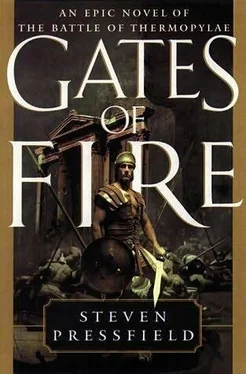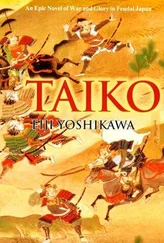Steven Pressfield - Gates of Fire - An Epic Novel of the Battle of Thermopylae
Здесь есть возможность читать онлайн «Steven Pressfield - Gates of Fire - An Epic Novel of the Battle of Thermopylae» весь текст электронной книги совершенно бесплатно (целиком полную версию без сокращений). В некоторых случаях можно слушать аудио, скачать через торрент в формате fb2 и присутствует краткое содержание. Жанр: Историческая проза, на английском языке. Описание произведения, (предисловие) а так же отзывы посетителей доступны на портале библиотеки ЛибКат.
- Название:Gates of Fire: An Epic Novel of the Battle of Thermopylae
- Автор:
- Жанр:
- Год:неизвестен
- ISBN:нет данных
- Рейтинг книги:3 / 5. Голосов: 1
-
Избранное:Добавить в избранное
- Отзывы:
-
Ваша оценка:
- 60
- 1
- 2
- 3
- 4
- 5
Gates of Fire: An Epic Novel of the Battle of Thermopylae: краткое содержание, описание и аннотация
Предлагаем к чтению аннотацию, описание, краткое содержание или предисловие (зависит от того, что написал сам автор книги «Gates of Fire: An Epic Novel of the Battle of Thermopylae»). Если вы не нашли необходимую информацию о книге — напишите в комментариях, мы постараемся отыскать её.
Gates of Fire: An Epic Novel of the Battle of Thermopylae — читать онлайн бесплатно полную книгу (весь текст) целиком
Ниже представлен текст книги, разбитый по страницам. Система сохранения места последней прочитанной страницы, позволяет с удобством читать онлайн бесплатно книгу «Gates of Fire: An Epic Novel of the Battle of Thermopylae», без необходимости каждый раз заново искать на чём Вы остановились. Поставьте закладку, и сможете в любой момент перейти на страницу, на которой закончили чтение.
Интервал:
Закладка:
The Greeks drew hints of this calamitous intelligence first from the omens taken on the morning of the second day's fighting, corroborated further by rumors and reports of deserters throughout the day, and ultimately confirmed by eyewitness testimony upon that evening, the end of the allies' sixth in possession of the pass of Thermopylae.
A nobleman of the enemy had come over to the Greek lines at the time of the changing of the first watch, approximately two hours after the cessation of the day's hostilities. He identified himself as Tyrrhastiadas of Kyme, a captain-of-a-thousand in the conscripted forces of that nation. This prince was the tallest, best-looking and most magnificently appareled personage of the enemy who had thus far deserted. He addressed the assembly in errorless Greek. His wife was a Hellene of Hallicarnassus, he declared; that, and the compulsion of honor, had impelled him to cross over to the allied lines. He informed the Spartan king that he had been present before Xerxes' pavilion this very evening when the traitor, whose name I have learned but here and evermore refuse to repeat, had come forward to claim the reward offered by His Majesty and to volunteer his services in guiding the forces of Persia along the secret track.
The noble Tyrrhastiadas went on to report that he had personally observed the issuance by His Majesty of the orders of march and the marshaling of the Persian battalions. The Immortals, their losses replaced and now numbering again their customary ten thousand, had set out at nightfall under command of their general, Hydarnes. They were on the march at this very moment, led by their traitor guide. They would be in the allied rear, in position to attack, by dawn.
His Majesty, cognizant of the catastrophic consequence for the Greeks of this betrayal, may marvel at their response in assembly to the timely and fortuitous warning delivered by the noble Tyrrhastiadas.
They didn't believe him.
They thought it was a trick.
Such an irrational and self-deluding response may be understood only in the light not alone of the exhaustion and despair which had by that hour overwhelmed the allies' hearts but by the corresponding exaltation and contempt of death, which are, like the mated faces of a coin, their obverse and concomitant.
The first day's fighting had produced acts of extraordinary valor and heroism.
The second began to spawn marvels and prodigies.
Most compelling of all was the simple fact of survival. How many times amid the manslaughter of the preceding forty-eight hours had each warrior stood upon the instant of his own extinction?
Yet still he lived. How many times had the masses of the foe in numbers overwhelming assaulted the allies with unstoppable might and valor? Yet still the front had held.
Three times on that second day the lines of the defenders teetered upon the point of buckling. His Majesty beheld the moment, immediately before nightfall, when the Wall itself stood breached and the massed myriads of the Empire clambered upon and over the stones, vaunting their victory cry. Yet somehow the Wall stood; the pass did not fall.
All day long, that second of battle, the fleets had clashed off Skiathos in mirrored reflection of the armies at the Gates. Beneath the bluffs of Artemisium the navies hammered each other, driving bronze ram against sheathed timber as their brothers contended steel against steel upon land. The defenders of the pass beheld the burning hulks, smudges against the horizon, and closer in, the flotsam of staved-in beams and spars, shivered oars and sailors' bodies facedown in the shore current. It seemed that Greek and Persian contended no longer as antagonists, but rather had entered, both sides, into some perverse pact whose aim was neither victory nor salvation, but merely to incarnadine earth and ocean with their intermingled blood. The very heavens appeared that day not as a peopled realm, assigning by their witness meaning to events below, but rather as a blank unholy face of slate, corn-passionless and indifferent. The mountain wall of Kal-lidromos overstanding the carnage seemed beyond all to embody this bereavement of pity in the featureless face of its silent stone. All creatures of the air had fled. No sign of green shoot lingered upon the earth nor within the clefts of rock.
Only the dirt itself possessed clemency. Alone the stinking soup beneath the warriors' tread proffered surcease and succor. The men's feet churned it into broth ankle-deep; their driving legs furrowed it to the depth of the calf, then they themselves fell upon it on their knees and fought from there. Fingers clawed at the blood-blackened muck, toes strained against it for purchase, the teeth of dying men bit into it as if to excavate their own graves with the clamp of their jaws.
Farmers whose hands had taken up with pleasure the dark clods of their native fields, crumbling between their fingers the rich earth which brings forth the harvest, now crawled on their bellies in this sterner soil, clawed at it with the nubs of their busted fingers and writhed without shame, seeking to immure themselves within earth's mantle and preserve their backs from the pitiless steel.
In the palaistrai of Hellas, the Greeks love to wrestle. From the time a boy can stand, he grapples with his mates, dusted with grit in pits of sand or oiled with ooze in rings of mud. Now the Hellenes wrestled in less holy precincts, where the sluice pail held not water but blood, where the prize was death and the umpire spurned all calls for stay or quarter. One witnessed again and again in the battles of the second day a Hellenic warrior fight for two hours straight, retire for ten minutes, without taking food and gulping only a cupped handful of water, then return to the fray for another two-hour round. Again and again one saw a man receive a blow that shattered the teeth within his jaw or split the bone of his shoulder yet did not make him fall.
On the second day I saw Alpheus and Maron take out six men of the foe so fast that the last two were dead before the first pair hit the ground. How many did the brothers slay that day? Fifty? A hundred? It would have taken more than an Achilles among the foe to bring them down, not solely in consequence of their strength and skill but because they were two who fought with a single heart.
All day His Majesty's champions came on, advancing in wave after wave with no interval to distinguish between nations or contingents. The rotation of forces which the allies had employed on the first day became impossible. Companies of their own will refused to forsake the line.
Squires and servants took up the arms of the fallen and assumed their places in the breach. No longer did men waste breath to cheer or rally one another to pride or valor. No more did warriors exult or vaunt their hearts in triumph. Now in the intervals of respite these simply fell, wordless and numb, into heaps of the unstrung and the undone. In the lee of the Wall, upon every hollow of sundered earth, one beheld knots of warriors shattered by fatigue and despair, eight or ten, twelve or twenty, dropped where they fell, in unmoving postures of horror and grief. None spoke or stirred. Instead the eyes of each stared without sight into inexpressible realms of private horror.
Existence had become a tunnel whose walls were death and within which prevailed no hope of rescue or deliverance. The sky had ceased to be, and the sun and stars. All that remained was the earth, the churned riven dirt which seemed to wait at each man's feet to receive his spilling guts, his shattered bones, his blood, his life. The earth coated every part of him. It was in his ears and nostrils, in his eyes and throat, under his nails and in the crease of his backside. It coated the sweat and salt of his hair; he spat it from his lungs and blew it slick with snot from his nose.
Читать дальшеИнтервал:
Закладка:
Похожие книги на «Gates of Fire: An Epic Novel of the Battle of Thermopylae»
Представляем Вашему вниманию похожие книги на «Gates of Fire: An Epic Novel of the Battle of Thermopylae» списком для выбора. Мы отобрали схожую по названию и смыслу литературу в надежде предоставить читателям больше вариантов отыскать новые, интересные, ещё непрочитанные произведения.
Обсуждение, отзывы о книге «Gates of Fire: An Epic Novel of the Battle of Thermopylae» и просто собственные мнения читателей. Оставьте ваши комментарии, напишите, что Вы думаете о произведении, его смысле или главных героях. Укажите что конкретно понравилось, а что нет, и почему Вы так считаете.












